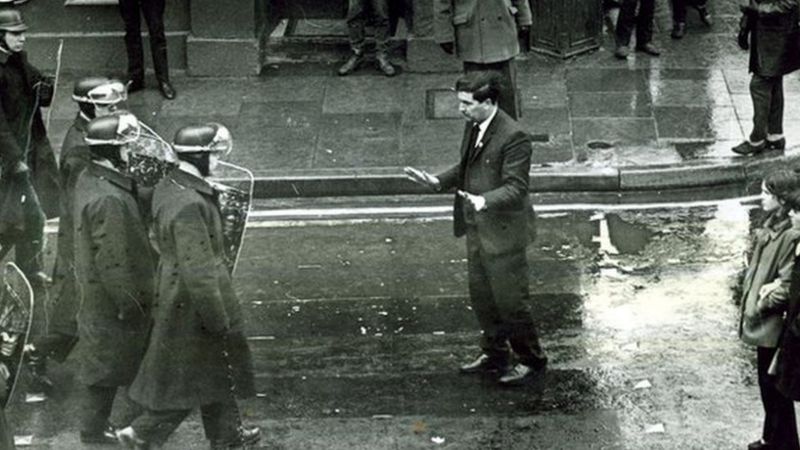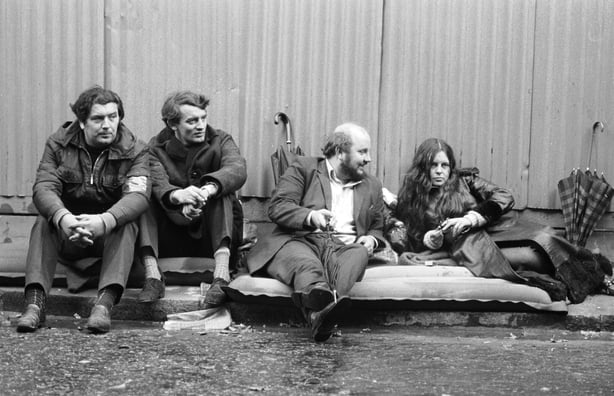I put my pen down, stunned. I could just about see where the Nelson Mandela analogy came from, in that McGuinness had been a violent revolutionary who had turned to the democratic system to advance his interests. But he had not done more than anyone to bring peace to Northern Ireland.
Northern Ireland in the mid 1960s was a powder keg. Ever since partition in the 1920s, the unionist majority, predominantly Protestant, had clung to their overwhelming power in part by political manipulation to exclude the nationalist, mainly Catholic minority, from jobs, housing, and the equal right to vote. Slight moves by the governing Ulster Unionist Party to improve the lot of nationalists had produced a hysterical reaction from some unionists, including Ian Paisley. On the other side of the divide, various civil rights movements were starting to spring up, advocating civil disobedience, inspired in part by the images from the Deep South of the United States.
One of those who joined the Derry Citizens’ Action Committee was teacher John Hume. Hume was elected to the Northern Irish Parliament as a nationalist, and helped to form the moderate nationalist Social Democratic and Labour Party in 1970. He was present at marches against internment without trial, and against the increasingly heavy-handed police and army actions of the early 1970s.
The street politics of Derry, late 1960s and early 1970s
The future of the nationalist movement did not look to be in electoral politics. What had begun as street protests and marches for better conditions was rapidly descending into armed conflict, as hatred at the Stormont government, the police, and increasingly the army was fuelling the rise of the Provisional IRA. Equally appalling was the actions of loyalist paramilitaries, who used fear of the IRA to justify appalling sectarian killings. At times, Northern Ireland seemed to teeter on the brink of total collapse. It was a hard time to be calling for peace and reconciliation.
Hume stuck to his (metaphorical) guns. He joined a hunger trike and sit in outside Downing Street in 1971, to highlight the plight of nationalists suffering at the hands of the Stormont administration. He was part of the team who helped to negotiate the Sunningdale Agreement in 1973, a false dawn of power sharing even as the carnage escalated. After becoming an MEP in 1979, and an MP in 1983, he cultivated links with the Irish-American political community, seeing the advantage that American influence would bring. Margaret Thatcher said the landmark Anglo-Irish Agreement of 1985, which conceded that the Republic of Ireland had a role to play in the future of Northern Ireland, was brought about in large part by American pressure.
From Downing Street sit in to the Oval Office
But it is for his willingness to talk to anyone who could bring about peace, even at risk of talking to those who would murder, for which John Hume will be remembered. In 1988, in an incident which seemed to be the very depths of depravity, mourners at an IRA funeral were killed by a loyalist gunman. At their funerals, two soldiers who drove into the procession were dragged from their car and beaten to death in the street. A picture of a Catholic priest kneeling over the soldiers, administering the last rites, was beamed around the world, epitomising the abyss into which Northern Ireland had sunk.
In the pocket of Father Alec Reid was a letter. It was from Gerry Adams, the leader of Sinn Fein, the political wing of the IRA. At the time, Adams was seen as so dangerous, so vile, that his voice was not allowed to even be heard by the British people, to deprive him of the "oxygen of publicity," as Margaret Thatcher put it. The letter was being sent to John Hume. Two less likely allies couldn't be imagined. But, thanks to the work of Father Alec Reid, the two men were corresponding. The letter set out the position of Sinn Fein for an end to the 'armed struggle,' and asked the SDLP leader for his take on them. It marked the start of the ‘Hume-Adams process,’ by which the IRA and Sinn Fein were gradually nudged away from the Armalite and towards the ballot box. First of all in secret, then in the open, these talks helped to persuade the IRA to declare a ceasefire in 1994. Unionist fury and scepticism was seemingly confirmed when the ceasefire collapsed in 1996, with a huge bomb in the London Docklands. But Hume kept going, amidst the derision.
It took a new government in Westminster in 1997, with a large enough majority to not be beholden to unionist votes, for the Northern Ireland peace process to really get going. I’ve told that tale before, so won’t do so again. But it was John Hume and David Trimble who shared the Noble Peace Prize in 1998, not Adams or McGuiness.
The years since have not been kind to Hume, or the SDLP. He suffered from the onset of dementia, to the point that he had no memory of his role in the history of the 20th century. The SDLP has seen itself overtaken by Sinn Fein, the former hardmen of violence, as the main party of nationalism in Northern Ireland. But the very fact that disagreements in Northern Ireland are played out politically, and not with bullets and bombs, is testament to the lasting impact of people like John Hume, who imagined and argued for a world of peace when it seemed virtually impossible to attain.
My feedback for that lesson largely consisted of outlining this story. And telling my trainee to think before he blurted out such sweeping statements. I feel that the former teacher, turned politician and Nobel Peace Prize winner, would have approved.
https://www.theguardian.com/commentisfree/2017/nov/20/john-hume-steered-northern-ireland-peace-process For the views of the late Seamus Mallon, that other senior SDLP giant, and his take on the significance of John Hume.





